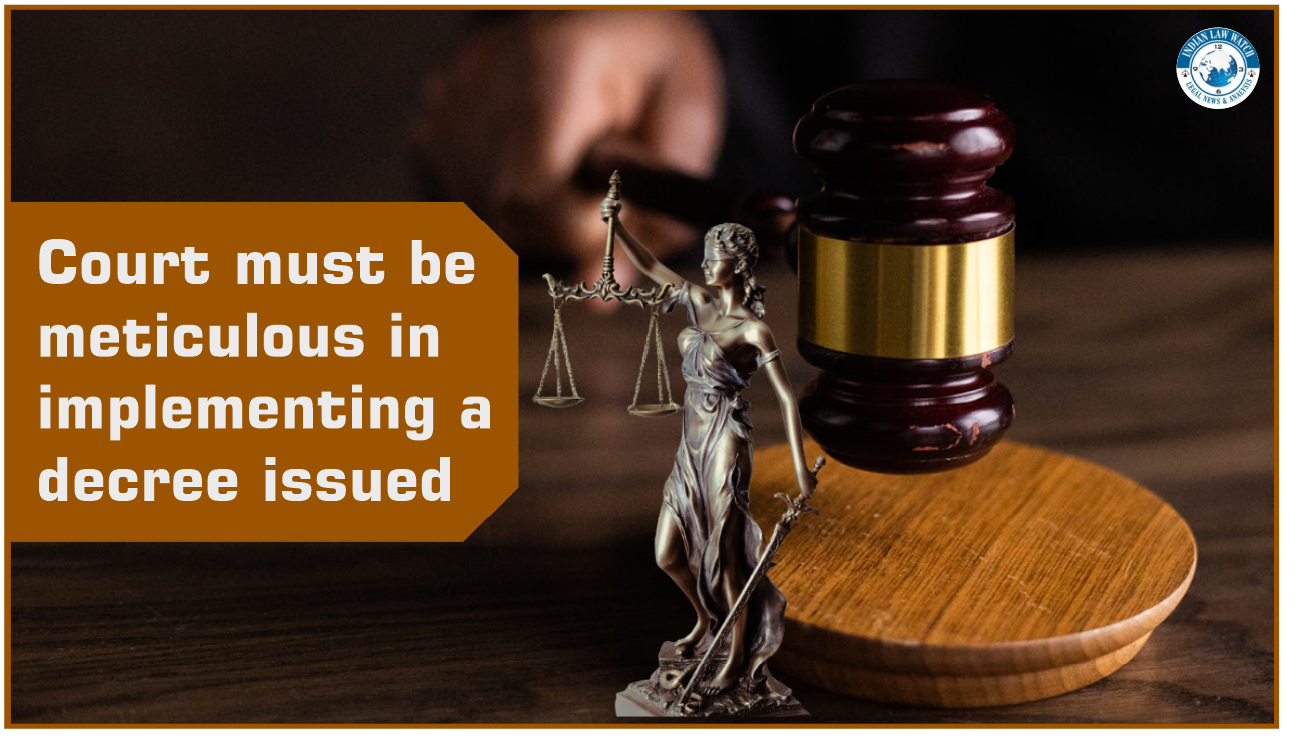

The case concerns a sale deed for which a specific performance directions was passed. The decree-holder, the party who won the case filed an execution petition, and the judgement debtor, the party who lost filed his objections, which were rejected by the court. The Court issued a direction to execute the sale deed, after getting the same approved from the court. Thereafter, the deed was executed in favour of the decree-holder.
The present appeal was brought because the appellant contended that the execution court violated Order XXI Rule 34 of the CPC by failing to invite objections of the judgment debtor upon the draft sale deed produced by the decree-holder.
RAJBIR v. SURAJ BHAN & ANR., CIVIL APPEAL NO. 1700 OF 2022

The execution of a deed is provided in Order XXI of the Code of Civil Procedure (CPC), which states that the court must be meticulous in implementing a decree issued after a lengthy adjudication; it is also the court’s obligation to execute the decree exactly as it is and in line with the law.
Rule 34 of Order XXI states that when objections are made, it is the court’s responsibility to serve the draft on the judgment debtor and to apply its thinking and make changes to the draft as needed.
Rule 34 is for decree for execution of document, or endorsement of negotiable instrument– where a decree is for the execution of a document or for the endorsement for a negotiable instrument and the judgment-debtor neglects or refuses to obey the decree, the decree-holder may prepare a draft of the document or endorsement in accordance with the terms of the decree and deliver the same to the Court. The Court shall thereupon cause the draft to be served on the judgment-debtor together with a notice requiring his objections (if any) to be made within such time as the Court fixes in this behalf. Where the judgment-debtor object to the draft, his objections shall be stated in writing within such time, and the court shall make such order approving or altering the draft, as it thinks fit.

Appellant/judgment debtor in his objections stated that the decree dated cannot be executed because of non-compliance of the decree holders, the appellant contended that in the aforementioned decree the Learned Civil Judge has specifically directed that the “decree holders shall deposit the remaining sale consideration within one month from the date of passing of judgment”.
Additionally, the learned counsel contended that the draft sale deed was not served upon him, for which he pleaded that it was a requirement, but the Hon’ble Court stated that no contentions were made by the judgment debtor regarding the same. According to the learned counsel for the petitioner further pleased that an application upon the appointment of a Local Commissioner for the execution of the deed and it is necessary to supply a copy of the same under ‘Order 21 Rule 34(2) of the Code of Civil Procedure.
The court while entertaining the appeal observed that if the decree is made for the execution of a document and the judgment debtor has failed to or refuses to follow it, the decree-holder shall make a draft of the document. This draft must be in accordance with the terms of the original deed and be delivered to the court by the decree-holder. Rule 34 makes it the duty of the court to cause the draft to be served upon judgment debtor. The same must be accompanied with a notice inviting objections to the draft deed for which the court may fix a time limit. It is upon the judgement debtor whether they wish to object.
The court further noted that the objections by the Judgement debtor on the execution petition should not be confused with his objections to the sale deed. Moreover, the appellant raising objections to the effect that even the decree is inexecutable and meritless, would not absolve the court of its duty to proceed with the matter of considering the draft sale deed and the objections thereto.
The court observed that the execution court must apply its mind and make altercations in the draft, when objections are filed, to make it in conformity with the decree (original document). Thereafter, the decree-holder has to deliver the draft with an altercation to the court on a proper stamp. Accordingly, the execution of the document is brought into effect by the court or the officer appointed.
 In the present case, the sale deed was executed in terms of the draft sale deed without objections being called for from the Judgement debtor. The court concluded by noting that the Order XXI Rule 34 of CPC cannot be diluted. Any departure from the provisions can have highly deleterious consequences, not only for the parties directly concerned with such deed but also for persons who come to deal with those parties in future. It can lead to further litigation. It is all of this which is sought to be avoided by bringing clarity and precision and execution must conform with the adjudication contained in the decree.
In the present case, the sale deed was executed in terms of the draft sale deed without objections being called for from the Judgement debtor. The court concluded by noting that the Order XXI Rule 34 of CPC cannot be diluted. Any departure from the provisions can have highly deleterious consequences, not only for the parties directly concerned with such deed but also for persons who come to deal with those parties in future. It can lead to further litigation. It is all of this which is sought to be avoided by bringing clarity and precision and execution must conform with the adjudication contained in the decree.





